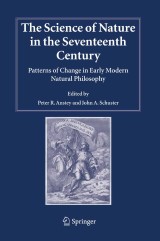Details

The Science of Nature in the Seventeenth Century
Patterns of Change in Early Modern Natural PhilosophyStudies in History and Philosophy of Science, Band 19
|
96,29 € |
|
| Verlag: | Springer |
| Format: | |
| Veröffentl.: | 28.06.2006 |
| ISBN/EAN: | 9781402037030 |
| Sprache: | englisch |
| Anzahl Seiten: | 248 |
Dieses eBook enthält ein Wasserzeichen.
Beschreibungen
One of the hallmarks of the modern world has been the stunning rise of the natural sciences. The exponential expansion of scientific knowledge and the accompanying technology that so impact on our daily lives are truly remarkable. But what is often taken for granted is the enviable epistemic-credit rating of scientific knowledge: science is authoritative, science inspires confidence, science is right. Yet it has not always been so. In the seventeenth century the situation was markedly different: competing sources of authority, shifting disciplinary boundaries, emerging modes of experimental practice and methodological reflection were some of the constituents in a quite different mélange in which knowledge of nature was by no means p- eminent. It was the desire to probe the underlying causes of the shift from the early modern ‘nature-knowledge’ to modern science that was one of the stimuli for the ‘Origins of Modernity: Early Modern Thought 1543–1789’ conference held in Sydney in July 2002. How and why did modern science emerge from its early modern roots to the dominant position which it enjoys in today’s post-modern world? Under the auspices of the International Society for Intellectual History, The University of New South Wales and The University of Sydney, a group of historians and philosophers of science gathered to discuss this issue. However, it soon became clear that a prior question needed to be settled first: the question as to the precise nature of the quest for knowledge of the natural realm in the seventeenth century.
The Onset of the Scientific Revolution.- ‘Waterworld’: Descartes’ Vortical Celestial Mechanics.- Circular Argument.- From Mechanics to Mechanism.- The Autonomy of Natural Philosophy.- Physico-Theology and the Mixed Sciences.- The Saturn Problem.- Experimental Versus Speculative Natural Philosophy.
<P>The seventeenth century marked a critical phase in the emergence of modern science. But we misunderstand this process, if we assume that seventeenth-century modes of natural inquiry were identical to the highly specialised, professionalised and ever proliferating family of modern sciences practised today. </P>
<P>In early modern Europe the central category for the study of nature was ‘natural philosophy’, or as Robert Hooke called it in his Micrographia, the Science of Nature. In this discipline general theories of matter, cause, cosmology and method were devised, debated and positioned in relation to superior disciplines, such as theology; cognate disciplines, such as mathematics and ethics; and subordinate disciplines, such as the ‘mixed mathematical sciences’ of astronomy, optics and mechanics. </P>
<P>Thus, the ‘Scientific Revolution’ of the Seventeenth Century did not witness the sudden birth of ‘modern science’ but rather conflict and change in the field of natural philosophy: Aristotelian natural philosophy was challenged and displaced, as thinkers competed to redefine natural philosophy and its relations to the superior, cognate and subordinate disciplines. From this process the more modern looking disciplines of natural science emerged, and the idea of a general Science of Nature suffered a slow demise. </P>
<P>The papers in this collection focus on patterns of change in natural philosophy in the seventeenth century, aiming to encourage the use and articulation of this category in the historiography of science. The volume is intended for scholars and advanced students of early modern history of science, history of philosophy and intellectual history. Philosophers of science and sociologists of scientific knowledge concerned with historical issues will also find the volume of relevance. Above all, the volume is addressed to anyone interested in current debates about the origin and nature of modern science.</P>
<P></P>
<P>In early modern Europe the central category for the study of nature was ‘natural philosophy’, or as Robert Hooke called it in his Micrographia, the Science of Nature. In this discipline general theories of matter, cause, cosmology and method were devised, debated and positioned in relation to superior disciplines, such as theology; cognate disciplines, such as mathematics and ethics; and subordinate disciplines, such as the ‘mixed mathematical sciences’ of astronomy, optics and mechanics. </P>
<P>Thus, the ‘Scientific Revolution’ of the Seventeenth Century did not witness the sudden birth of ‘modern science’ but rather conflict and change in the field of natural philosophy: Aristotelian natural philosophy was challenged and displaced, as thinkers competed to redefine natural philosophy and its relations to the superior, cognate and subordinate disciplines. From this process the more modern looking disciplines of natural science emerged, and the idea of a general Science of Nature suffered a slow demise. </P>
<P>The papers in this collection focus on patterns of change in natural philosophy in the seventeenth century, aiming to encourage the use and articulation of this category in the historiography of science. The volume is intended for scholars and advanced students of early modern history of science, history of philosophy and intellectual history. Philosophers of science and sociologists of scientific knowledge concerned with historical issues will also find the volume of relevance. Above all, the volume is addressed to anyone interested in current debates about the origin and nature of modern science.</P>
<P></P>
One of few books to take seriously the early modern category of "natural philosophy" as the field and activity in which knowledge of nature was pursued and contested Chapters cover key dimensions of the dynamics of the field of natural philosophy, hence promote use and articulation of this important concept in historiography of science Chapters are by leading internationally reputed experts in their respective specialities, focused on theme of changing patterns in and dynamics of natural philosophy in the 17th century


















